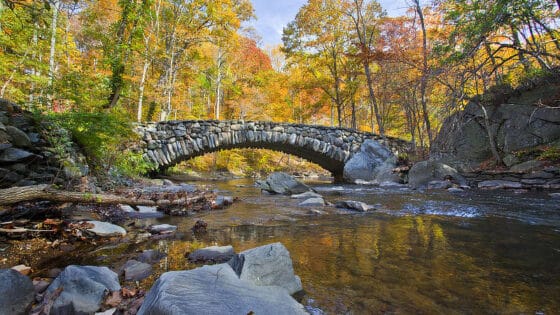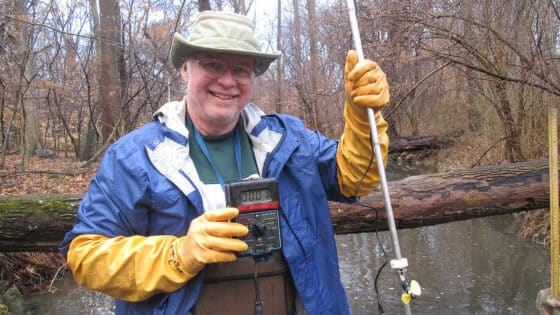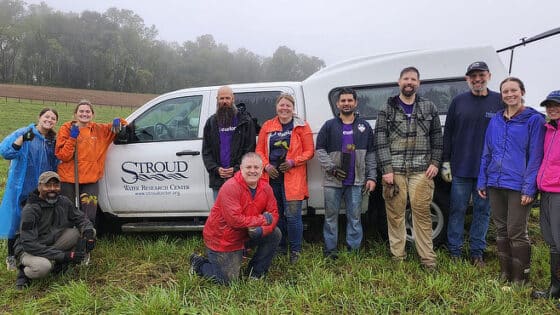Stroud Scientists at Work
Studying Tropical Waters To Understand the Impacts of Climate Change
Stroud Educators at Work
The Future of Education: Developing New Teaching Paradigms
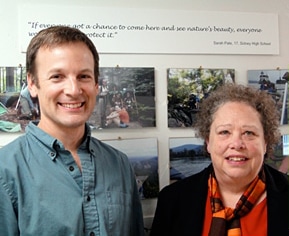
When the National Science Foundation (NSF) funded three Stroud Center education programs last year: Cultivating an Ecosystem Esthetic, Watershed Citizenship Learning Community, and Model My Watershed®, it effectively placed the Stroud Center’s educational ideas on a national stage and underscored its leadership role in creating the kinds of innovative programming that will excite students of all ages in environmental sciences well into the 21st century.
“What we’re trying to do,” says the Stroud Center’s education director, Susan Gill of her team’s efforts, “is to stretch the boundaries of what education can be.”
Her goal? To develop new teaching paradigms and programs that will catalyze interest in science, technology, engineering and math, and use them to cultivate both awareness about water issues and the skills to address them.
The programs are each grounded in the science of the Stroud Center, but they are further enriched by their intentional leverage of community and Web 2.0 technologies, aspects that appeal to a younger and more web savvy generation, and which enable accessibility and broad dissemination.
In 2009, the Stroud Center’s watershed education programs served more than 3,500 students, teachers and adults. Stroud Center educator Christina Medved says, “Being able to extend our reach beyond the classroom, to those individuals we can’t reach personally, is essential to sharing our science and spreading the message of stewardship; our new programs will help us do just that.”
Empowering Citizens to Solve Water Management Problems
The programs, which target a range of audiences from middle and high school aged children, to college students and adults, each incorporate an evaluation component — testing not just the student, but the curriculum itself, and providing valuable insights that will continue to shape the next generation of education ideas and curricula. For example, almost a year later, modifications are already being incorporated into Cabrini College’s Watershed Citizenship Learning Community curricula. “We wanted to broaden its scope to study larger watersheds like the Delaware River basin, which includes four states,” says Gill. “That single change will help us be more effective in conveying the real complexities of watershed management.” She explains that larger watersheds naturally pose a richer and more realistic set of challenges because political boundaries and differing priorities by region inevitably shape the decisions and trade-offs of development and watershed management.
“We need to empower citizens to work collaboratively to solve water management problems,” says Gill. “To do so, we’re taking a multi-dimensional approach and creating a suite of tools that provide the facts and equip individuals for involvement at many levels.” The Stroud Center’s Leaf Pack Experiment Kit is being calibrated to enable so-called “citizen scientists” to easily and inexpensively conduct water quality assessments, Model My Watershed provides the platform to model land use planning options and project the consequential impact, and the Watershed Citizenship Learning Community curricula combines science with the social side of community responsibility and involvement; the idea is to give people what they need to start the dialogue and to coalesce around a viable plan for watershed stewardship and management.
Expanding Our Reach Through Technology
What does Gill see as the next step forward for education? “So much of what we do can benefit from technology,” says Gill. Using the capability of the internet to engage mass audiences, reinforce shared community interests, and disseminate water quality data and tools is key. “By continuing to build our programs around Web 2.0 technologies, we can expand our reach and bring our science home to people everywhere.” In effect, expanding the classroom to the web ensures that the Stroud Center’s influence has fewer boundaries, and citizens everywhere can be empowered to make more informed choices that affect the quality and availability of their water.
Outreach
The Water’s Edge Presents: Dr. Peter Gleick on Water in the 21st Century: New Thinking for a Sustainable Future
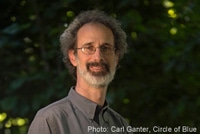
The demand for Dr. Peter Gleick, a MacArthur fellow, member of the National Academy of Sciences, author of the definitive, biennial review of water, The World’s Water, and president and co-founder of the California-based Pacific Institute, is strong — as strong as his commitment to addressing the connections among water and health, human rights, climate change, privatization and international conflict. One of the world’s foremost experts on water, he advises heads of state and policy makers around the globe. Dr. Gleick will be our guest speaker at The Water’s Edge on October 7th.
Shortly before he boarded a plane for a series of meetings in places as far flung as Florida, Nairobi, and England, Gleick, whose think tank produces research and policy analyses on critical issues including water, took the time to chat with us about his thinking on Water in the 21st Century, the subject of his talk for the Stroud Water Research Center’s 8th annual fundraising gala this fall. The following is an excerpt from that conversation.
What will it take to provide clean water for the world’s people in this century? “While there is no single, silver bullet,” says Gleick, “there are many things we can do to attain that goal, provided we have the will.” Despite the challenges we face, Gleick remains both a pragmatist and an optimist. “We can achieve a much more positive future for water,” he maintains, “if we simply think about what we want and are willing to take the steps to move in the right direction.”
For many around the globe, the responsibility to provide the family with water for its daily needs keeps women from both education and work, contributing to the cycle of poverty. Gleick argues that governments must establish sustainable strategies to meet the basic water needs of their populations.
Rethinking Our Supply of Water
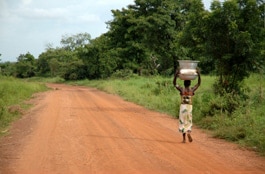
In the 20th century, developed nations focused on building the physical infrastructure required to capture, store, treat and transport water, including dams, reservoirs, aqueducts and treatment plants. The emphasis this century—if we’re to effectively manage our water resources—will be decidedly different. We must rethink everything from water allocations to water pricing, to water management and conservation, says Gleick. We need to focus on smarter use, use that is aligned with the actual need.
“The quality of the water should match the use of that water,” he states. “Do we need to use potable water to flush our toilets? Must we really apply treated water to our golf courses?” The answer, of course, is no. There are smarter choices and there is no better time than now to implement them.
To create a sustainable future will require that we approach our water challenges with the understanding that water is at the center of all we do. It’s inextricably linked, says Gleick, to everything from our food and culture, to energy and the economy, to international security and climate change, and to our health and education. It continues to have an enormous impact on gender, as in many cultures women are denied access to both education and work because of their essential role in providing the family with its water, an effort that can require daily trips of several hours to distant sources.
Therefore, individuals and institutions—both local and national, as well as the international agencies of influence—must rethink their respective roles, responsibilities, and the strategies to ensure that the fundamental human right of universal access to basic water services is met. And all must acknowledge this obligation as a priority, while moving in parallel to address that challenge with a variety of solutions that account for these very important connections.
The Concept of Peak Water
Water is a limited resource; unlike oil, there is no substitute for it. The amount of water on our planet has not changed since time began. If we continue to tap it at rates faster than the water table can replenish itself, the well will literally dry up. This is one aspect of Gleick’s concept of Peak Water. The second concept relates to the ecosystem.
How we use water must also consider the ecological harm of using too much. “There is a point where removing more water actually causes more ecological harm and more damage to society than it provides benefits,” says Gleick, pointing to the plight of China, India, and even some parts of the United States.
He notes that the 1,450-mile Colorado River is a shared resource on which seven states and parts of Mexico depend to grow their food and to fuel their economies. But the river, which has ten dams to block its path, is being siphoned of its flow at such a rate that it no longer consistently reaches the ocean. For those communities it serves in its lower reaches, the river has all but run dry.
“We have enough water,” Gleick says, “if we allocate it fairly and use it wisely.”
The New Economy of Water
Gleick believes that there are pros and cons with regard to the privatization of water—the transfer of some or all of the assets or operations of public water systems into private hands and he acknowledges the benefits this approach can have in providing basic water services to the world’s poorest. However, “water has vital social, cultural and ecological roles to play that cannot be protected by purely market forces,” he explains, arguing that governments should establish public ownership or control of water sources, and that oversight of privatization agreements is essential.
His analysis of both successful and failed attempts to privatize water have led him to develop basic principles and standards for privatization contracts, designed to protect basic human needs and to ensure that water remains both an economic and a social good.
In the News
Sweeney Receives Accolades
Garden Club of America Bestows Sweeney With Honorary Membership
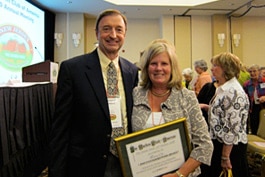
On Saturday, May 15th, 2010, at the organization’s 97th Annual Meeting in Brunswick, NJ, the Executive Committee and Board of Directors of the Garden Club of America (GCA) named Dr. Bernard W. Sweeney, director of the Stroud Water Research Center, an Honorary Member. Sweeney, the recipient of the Club’s 2006 Margaret Douglas Medal for conservation education, was proposed for honorary membership by West Chester and Wilmington Garden Club of America members, Mrs. Thomas Swett (Carolyn) and Mrs. Charles Cruice (Kathryn). Through participation in committees, publications, and the civic and educational efforts of the GCA, this honor puts Sweeney in a position to influence the tens of thousands of Garden Club of America members, who share the Center’s goals of freshwater conservation.
“As gardeners,” The Garden Club of America states in its new Water Pamphlet, “we have always appreciated the value of clean, available water… Today, as daily news reports appear about droughts, water-rationing, dead zones in the oceans, pollution from run-off, we are aware that water problems abound. As leaders in our communities, our garden clubs need to educate ourselves so that we, in turn, can educate others. We can change from being part of the problem to being catalysts for solutions.”
Sweeney has been a longtime supporter of The GCA’s efforts, as well as a frequent speaker. “The GCA is a wonderful organization that benefits both community and the environment, and its powerful voice conveys the gardening and conservation practices that protect and preserve our water supply. We need the GCA,” said Bern Sweeney.
NABS Presents Sweeney With Distinguished Service Award
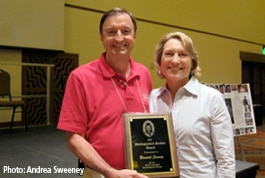
The North American Benthological Society (NABS), an international scientific organization whose purpose is to promote further understanding of aquatic ecosystems and foster exchange of scientific information among its membership and professional societies, resource managers, policy makers, educators, and the public, awarded Dr. Bernard W. Sweeney, Director of Stroud Water Research Center, with its Distinguished Service Award at its Annual Meeting in Santa Fe, NM on June 11th. Sweeney, who served as president of NABS from 2001-2002, has been Chairman of the Society’s Taxonomic Certification Committee since 2004 and a member of the NABS Editorial Board since 2003, was nominated by his peers for the honor.
EPA Appoints Sweeney to Scientific Advisory Board
In May, Sweeney was also appointed to the Environmental Protection Agency’s Science Advisory Board as a Member of the Advisory Panel on Ecological Impacts Associated with Mountaintop Mining and Valley-Fills. Sweeney is frequently called upon to provide independent, expert scientific testimony in environmental matters related to fresh water, and as such is also a member of the Pennsylvania Department of Environmental Protection Flood Protection Committee.
Learn more about the Mountaintop Mining – Valley Fill Ecological Assessment.
Stroud Scientists and Educators Present
Disseminating Our Findings to Our Peers and the Public at Large
Our ability to disseminate our findings to a broad audience allows us to increase awareness and create a public dialogue centered on the protection, preservation and restoration of watersheds everywhere. It’s for that reason that our scientists and educators engage in both scientific and public forums to share their findings. The following highlights recent presentations.
Stream Trees: Our Water’s Natural Defense
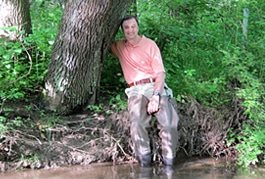
The DuPont Environmental Education Center on the Riverfront of Wilmington, Delaware, home to the Delaware Nature Society, was the setting for the Delaware’s Watersheds Lecture Series and Bern Sweeney’s presentation, Stream Trees: Our Water’s Natural Defense.
Sweeney, the Stroud Center’s director, is responsible for orchestrating the planting of more than 100,000 trees in southeastern Pennsylvania in an effort to protect the Christina River and improve its water quality for use by New Castle County, Delaware, residents and wildlife. His decades long research on the role of streamside forests in the structure and function of stream and river ecosystems was also the subject of a talk entitled, Water Quality Benefits of Riparian Forest Buffers, for the Society of Women Environmental Professionals Capital Chapter Conference in Harrisburg, Pennsylvania, in March.
Read the abstract or the full paper, Riparian deforestation, stream narrowing, and loss of stream ecosystem services.
THE STATE OF THE SCHUYKILL RIVER
Stroud Center scientist, John Jackson, presented The State of the Schuylkill River: Past, Present and Future, at the Schuylkill Learning Community’s annual retreat in April. Jackson used data from 15 years of study on 156 stream sites distributed throughout the Schuylkill River basin, as the basis for his discussion about the differences in ecological condition, the specific factors that contribute to these differences, and how conditions have changed since the early 1970s. Findings from the research provide a foundation that will inform the community’s management and restoration efforts.
GROUND WATER AND SURFACE WATER: A SINGLE RESOURCE
The May 6th gathering of the Pennsylvania Water Symposium in State College, Pennsylvania provided a forum for 200 experts representing watershed groups, conservation districts, planning commissions, and state agencies including the Department of Environmental Protection, Environmental Protection Agency, US Geological Survey, United States Department of Agriculture, as well as educators and research institutions — all of whom where there to discuss the key water resource management issues and priorities of the state. Among the presenters was Stroud Center scientist, Anthony Aufdenkampe, who discussed the benefits of real-time, in-situ sensor networks installed in the Christina River Basin, the result of the new Critical Zone Observatory, and their role in assisting state agencies in monitoring water quality.
TAKING ON NABS
Bern Sweeney, the Stroud Center’s director, was awarded the Distinguished Service Award, by the North American Benthological Society, and scientists from the Stroud Center presented scientific findings to their peers at the 2010 joint Summer Meeting of the North American Benthological Society (NABS) and the American Society of Limnology and Oceanography, in Santa Fe, New Mexico, in June. The meeting’s theme: Aquatic Sciences: Global Changes from the Center to the Edge, focused on inland waters and the inter-dependencies of aquatic systems and humankind. Presentations from the Stroud Center’s scientists covered topics including: food web dynamics, the invertebrate community structures of floodplain ponds, the phenomenon of climatic differences in the tropics and their influence on watershed and stream conditions, the use of a Stroud patented bioreactor as a model system to duplicate various stream metabolism processes, and the effect of temperature changes on warm water fish species and aquatic macroinvertebrates. Presenters included Drs. David Arscott, John Jackson, Lou Kaplan, J. Denis Newbold, Bern Sweeney, research associate Yin-Phan Tsang, and Ph.D. candidate from the University of Pennsylvania, Christine McLaughlin.
WATERSHED = FOODSHED
As part of the Livable Landscapes, Sustainable Communities track of the 2010 Pennsylvania Land Conservation Conference hosted by the Pennsylvania Land Trust in Malvern, Pennsylvania, in April, the Stroud Center’s director, Bern Sweeney, presented a lecture entitled, Watershed = Foodshed, and discussed the importance of watershed protection and best management practices for farmers to ensure clean water, healthy food and a vibrant community. The 400 attendees who included: land trust staff, watershed professionals, conservation district staff, as well as farm and agricultural preservation boards, joined Sweeney and members of the Brandywine Conservancy and Natural Lands Trust for a presentation about the regulatory and non-regulatory watershed conservation tools available to municipalities.
WATERSHED TEA REDUX
Stroud Center scientist Lou Kaplan presented Dissolved Organic Matter in Stream Ecosystems: Watershed Tea Redux to the faculty and students of the University of Connecticut’s Geosciences department in March, to explain the role of leaf litter as an energy supply for downstream communities of microbes and macroinvertebrates, and its potential to affect the climate.
THE SCIENCE OF WATER
As part of Audubon Greenwich’s Nature Program Events, the Stroud Center’s director Bern Sweeney presented The Science of Water. The overview of the Stroud Center’s research and the role we each play in the preservation of our drinking water supply came just weeks after Earth Day and during the EPA’s celebration of National Drinking Water Week.
Like what you’ve read? Subscribe!

